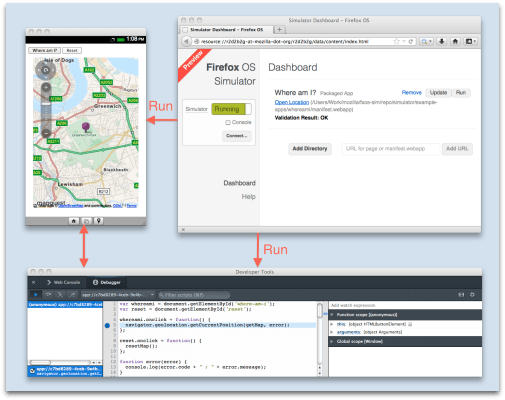Mozilla was keen to talk up the 3.0 version of its Firefox OS simulator back in March, but didn’t have much to share about when eager developers could start fiddling with it. Thankfully for HTML5 buffs, that six-week quiet period is over — the team just announced on the official Mozilla Hacks blog that the newly updated simulator is now available to download.
All of the features that appeared in the preview release are accounted for — think support for rotating displays and a mock geolocation API for testing location-aware apps — but the simulator suite has been polished a bit since we last saw it. Most of those tweaks are housekeeping changes: the size of the download has been reduced, which has led to snappier boot times, and the simulator now supports common OS shortcuts like Cmd + Q to shut down, but the simulator has also been updated to run newer versions of Firefox OS and the Gaia user interface layer.
With that said, prospective Firefox OS developers will probably use one simulator feature more than any other: the ability to push work-in-progress applications to connected test devices. Mozilla and its hardware partners Huawei, LG, and ZTE (who showed off its first FFOS device at Mobile World Congress) have been pointing to device launches in Brazil, Colombia, Hungary, Mexico, Poland, Serbia, Spain and Venezuela later this year, but the quality of the experiences found on those phones will ultimately determine whether or not Firefox OS flops.
Even so, strong early sales of Firefox OS developer devices may point to a promising official launch for the first set of consumer-facing phones later this year. Just look at Spanish hardware OEM startup Geeksphone — it began selling its Keon and Peak reference devices for $119 and $194, respectively, late last month, and the company was forced to limit the number of handsets sold that on launch day so the 20-person team could keep up with shipping.
That’s a promising start especially for a company as young as Geeksphones, but there’s no question that Firefox OS is going to face some serious competition in its launch markets. Android powers a staggering number of cheap smartphones, and Nokia has refocused its efforts to build low-cost devices based both on Windows Phone and the aging Series 40 OS. Meanwhile, persistent rumors of a low-cost iPhone continue to make the rounds — Firefox OS seemed like a novel option for new and adventurous smartphone owners when I first played with it, but we’ll have to see how the rest of the industry responds.
